Organisation Behaviour Report: Analysis of Ford Company's Culture
VerifiedAdded on 2023/01/13
|16
|5538
|89
Report
AI Summary
This report delves into the organizational behaviour of the Ford Motor Company, examining how culture, power dynamics, and politics influence individual and team behavior. It explores various aspects, including Handy's culture theory, French and Raven's power model, and the impact of organizational politics. The report further investigates motivational techniques, such as Alderfer's ERG theory, and their role in fostering effective achievement within the organization. It also addresses team development, contrasting effective and ineffective team dynamics, and applying relevant theories to support corporate development. Finally, the report evaluates how organizational behaviour philosophies and concepts inform and influence behavior in the present situation. The analysis provides a comprehensive overview of how these factors contribute to Ford's overall performance and employee engagement.
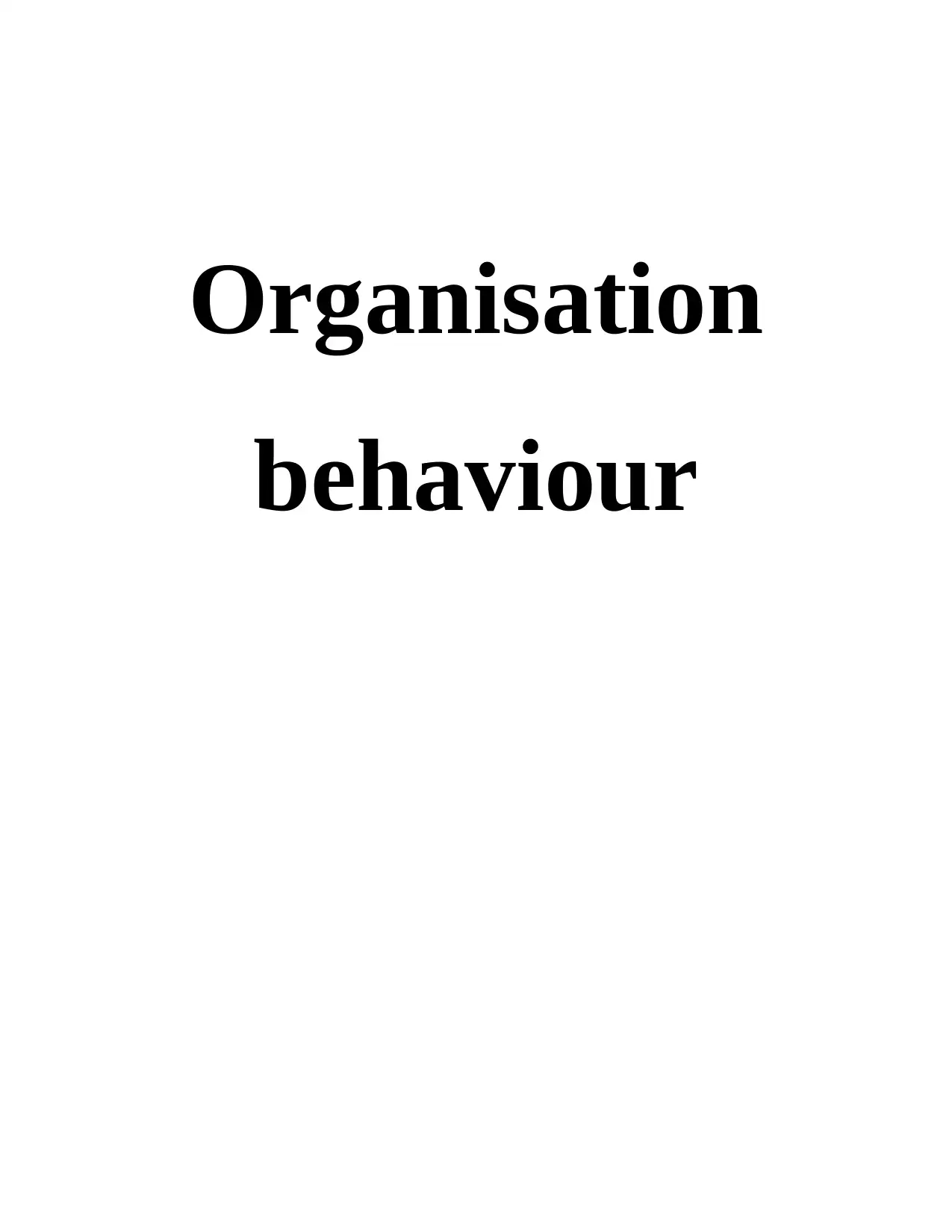
Organisation
behaviour
behaviour
Paraphrase This Document
Need a fresh take? Get an instant paraphrase of this document with our AI Paraphraser
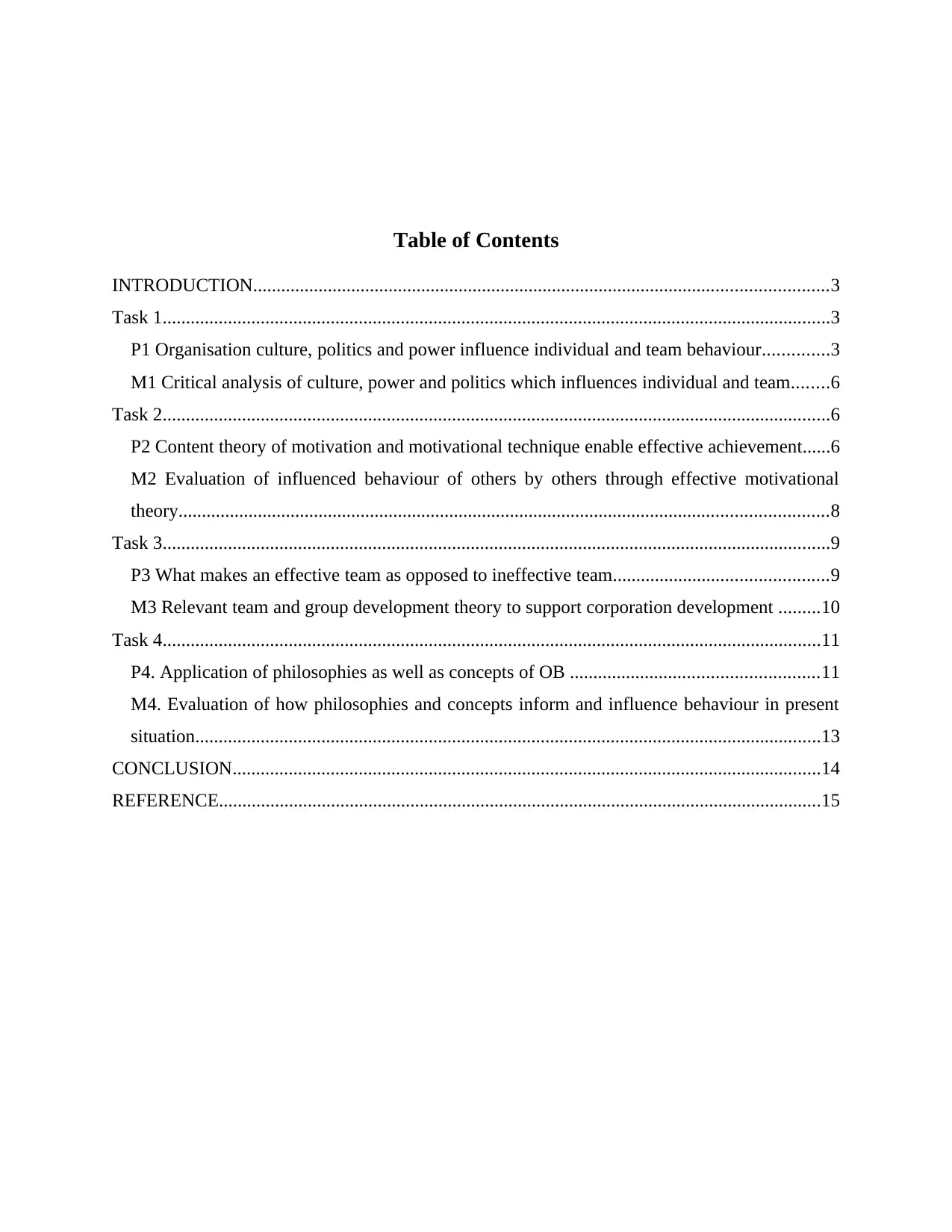
Table of Contents
INTRODUCTION...........................................................................................................................3
Task 1...............................................................................................................................................3
P1 Organisation culture, politics and power influence individual and team behaviour..............3
M1 Critical analysis of culture, power and politics which influences individual and team........6
Task 2...............................................................................................................................................6
P2 Content theory of motivation and motivational technique enable effective achievement......6
M2 Evaluation of influenced behaviour of others by others through effective motivational
theory...........................................................................................................................................8
Task 3...............................................................................................................................................9
P3 What makes an effective team as opposed to ineffective team..............................................9
M3 Relevant team and group development theory to support corporation development .........10
Task 4.............................................................................................................................................11
P4. Application of philosophies as well as concepts of OB .....................................................11
M4. Evaluation of how philosophies and concepts inform and influence behaviour in present
situation......................................................................................................................................13
CONCLUSION..............................................................................................................................14
REFERENCE.................................................................................................................................15
INTRODUCTION...........................................................................................................................3
Task 1...............................................................................................................................................3
P1 Organisation culture, politics and power influence individual and team behaviour..............3
M1 Critical analysis of culture, power and politics which influences individual and team........6
Task 2...............................................................................................................................................6
P2 Content theory of motivation and motivational technique enable effective achievement......6
M2 Evaluation of influenced behaviour of others by others through effective motivational
theory...........................................................................................................................................8
Task 3...............................................................................................................................................9
P3 What makes an effective team as opposed to ineffective team..............................................9
M3 Relevant team and group development theory to support corporation development .........10
Task 4.............................................................................................................................................11
P4. Application of philosophies as well as concepts of OB .....................................................11
M4. Evaluation of how philosophies and concepts inform and influence behaviour in present
situation......................................................................................................................................13
CONCLUSION..............................................................................................................................14
REFERENCE.................................................................................................................................15
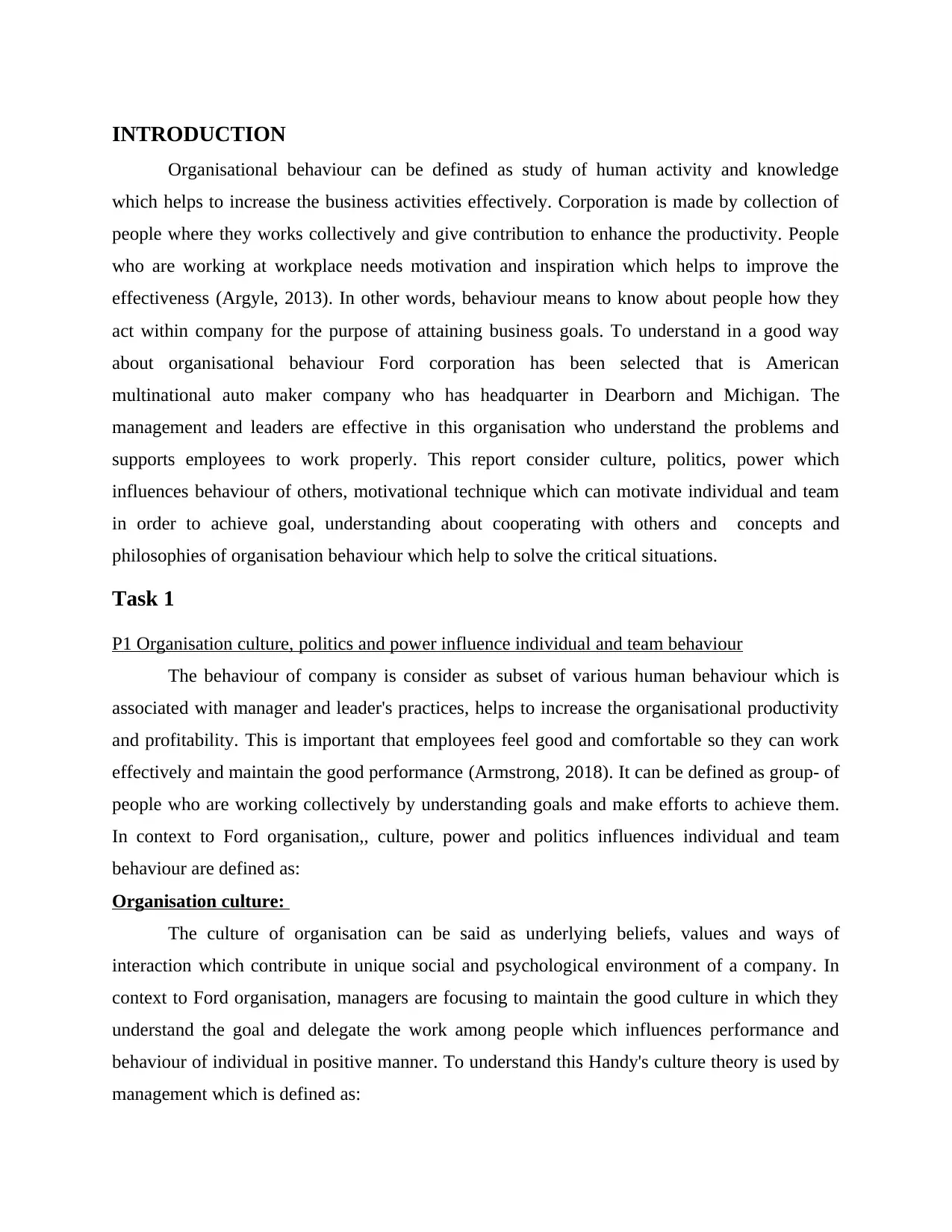
INTRODUCTION
Organisational behaviour can be defined as study of human activity and knowledge
which helps to increase the business activities effectively. Corporation is made by collection of
people where they works collectively and give contribution to enhance the productivity. People
who are working at workplace needs motivation and inspiration which helps to improve the
effectiveness (Argyle, 2013). In other words, behaviour means to know about people how they
act within company for the purpose of attaining business goals. To understand in a good way
about organisational behaviour Ford corporation has been selected that is American
multinational auto maker company who has headquarter in Dearborn and Michigan. The
management and leaders are effective in this organisation who understand the problems and
supports employees to work properly. This report consider culture, politics, power which
influences behaviour of others, motivational technique which can motivate individual and team
in order to achieve goal, understanding about cooperating with others and concepts and
philosophies of organisation behaviour which help to solve the critical situations.
Task 1
P1 Organisation culture, politics and power influence individual and team behaviour
The behaviour of company is consider as subset of various human behaviour which is
associated with manager and leader's practices, helps to increase the organisational productivity
and profitability. This is important that employees feel good and comfortable so they can work
effectively and maintain the good performance (Armstrong, 2018). It can be defined as group- of
people who are working collectively by understanding goals and make efforts to achieve them.
In context to Ford organisation,, culture, power and politics influences individual and team
behaviour are defined as:
Organisation culture:
The culture of organisation can be said as underlying beliefs, values and ways of
interaction which contribute in unique social and psychological environment of a company. In
context to Ford organisation, managers are focusing to maintain the good culture in which they
understand the goal and delegate the work among people which influences performance and
behaviour of individual in positive manner. To understand this Handy's culture theory is used by
management which is defined as:
Organisational behaviour can be defined as study of human activity and knowledge
which helps to increase the business activities effectively. Corporation is made by collection of
people where they works collectively and give contribution to enhance the productivity. People
who are working at workplace needs motivation and inspiration which helps to improve the
effectiveness (Argyle, 2013). In other words, behaviour means to know about people how they
act within company for the purpose of attaining business goals. To understand in a good way
about organisational behaviour Ford corporation has been selected that is American
multinational auto maker company who has headquarter in Dearborn and Michigan. The
management and leaders are effective in this organisation who understand the problems and
supports employees to work properly. This report consider culture, politics, power which
influences behaviour of others, motivational technique which can motivate individual and team
in order to achieve goal, understanding about cooperating with others and concepts and
philosophies of organisation behaviour which help to solve the critical situations.
Task 1
P1 Organisation culture, politics and power influence individual and team behaviour
The behaviour of company is consider as subset of various human behaviour which is
associated with manager and leader's practices, helps to increase the organisational productivity
and profitability. This is important that employees feel good and comfortable so they can work
effectively and maintain the good performance (Armstrong, 2018). It can be defined as group- of
people who are working collectively by understanding goals and make efforts to achieve them.
In context to Ford organisation,, culture, power and politics influences individual and team
behaviour are defined as:
Organisation culture:
The culture of organisation can be said as underlying beliefs, values and ways of
interaction which contribute in unique social and psychological environment of a company. In
context to Ford organisation, managers are focusing to maintain the good culture in which they
understand the goal and delegate the work among people which influences performance and
behaviour of individual in positive manner. To understand this Handy's culture theory is used by
management which is defined as:
⊘ This is a preview!⊘
Do you want full access?
Subscribe today to unlock all pages.

Trusted by 1+ million students worldwide
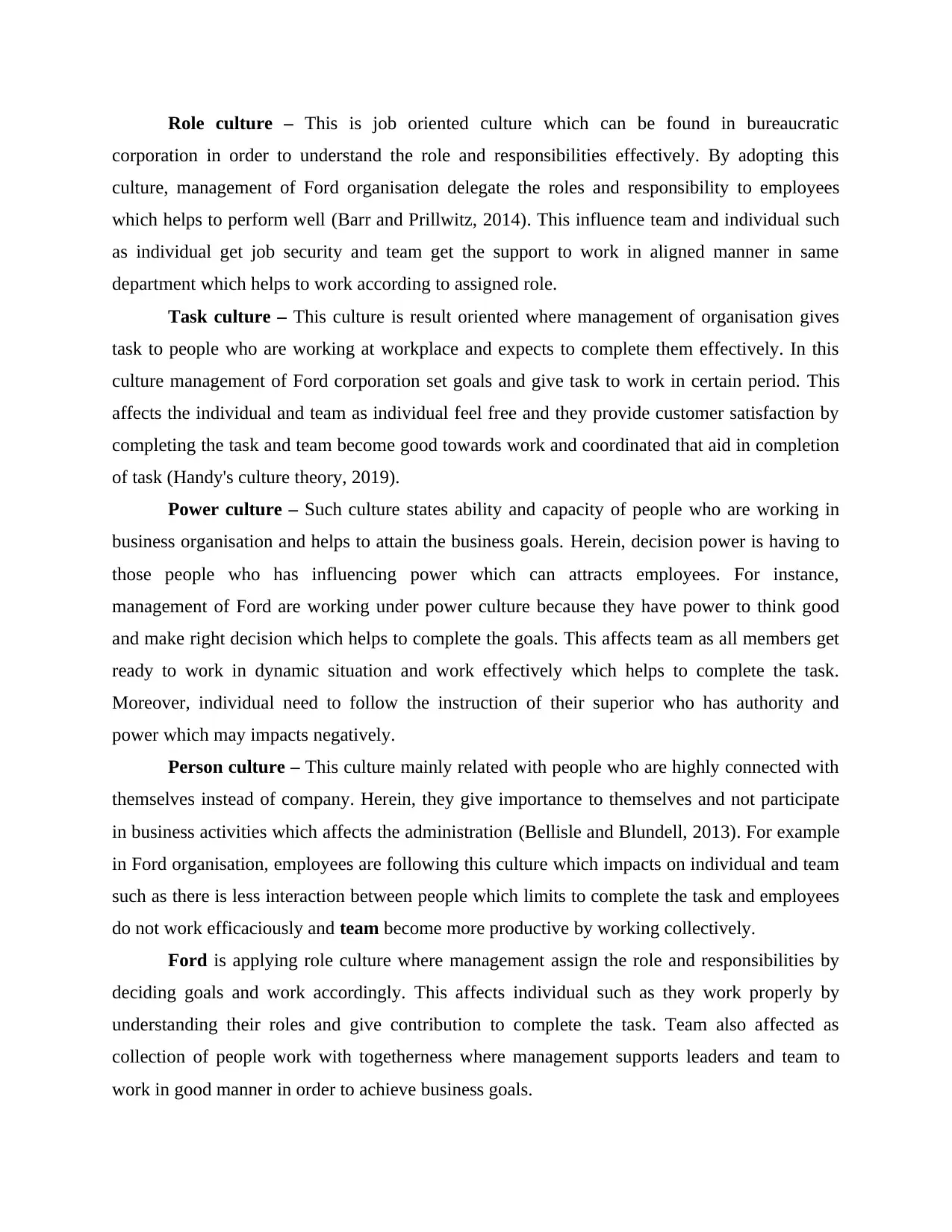
Role culture – This is job oriented culture which can be found in bureaucratic
corporation in order to understand the role and responsibilities effectively. By adopting this
culture, management of Ford organisation delegate the roles and responsibility to employees
which helps to perform well (Barr and Prillwitz, 2014). This influence team and individual such
as individual get job security and team get the support to work in aligned manner in same
department which helps to work according to assigned role.
Task culture – This culture is result oriented where management of organisation gives
task to people who are working at workplace and expects to complete them effectively. In this
culture management of Ford corporation set goals and give task to work in certain period. This
affects the individual and team as individual feel free and they provide customer satisfaction by
completing the task and team become good towards work and coordinated that aid in completion
of task (Handy's culture theory, 2019).
Power culture – Such culture states ability and capacity of people who are working in
business organisation and helps to attain the business goals. Herein, decision power is having to
those people who has influencing power which can attracts employees. For instance,
management of Ford are working under power culture because they have power to think good
and make right decision which helps to complete the goals. This affects team as all members get
ready to work in dynamic situation and work effectively which helps to complete the task.
Moreover, individual need to follow the instruction of their superior who has authority and
power which may impacts negatively.
Person culture – This culture mainly related with people who are highly connected with
themselves instead of company. Herein, they give importance to themselves and not participate
in business activities which affects the administration (Bellisle and Blundell, 2013). For example
in Ford organisation, employees are following this culture which impacts on individual and team
such as there is less interaction between people which limits to complete the task and employees
do not work efficaciously and team become more productive by working collectively.
Ford is applying role culture where management assign the role and responsibilities by
deciding goals and work accordingly. This affects individual such as they work properly by
understanding their roles and give contribution to complete the task. Team also affected as
collection of people work with togetherness where management supports leaders and team to
work in good manner in order to achieve business goals.
corporation in order to understand the role and responsibilities effectively. By adopting this
culture, management of Ford organisation delegate the roles and responsibility to employees
which helps to perform well (Barr and Prillwitz, 2014). This influence team and individual such
as individual get job security and team get the support to work in aligned manner in same
department which helps to work according to assigned role.
Task culture – This culture is result oriented where management of organisation gives
task to people who are working at workplace and expects to complete them effectively. In this
culture management of Ford corporation set goals and give task to work in certain period. This
affects the individual and team as individual feel free and they provide customer satisfaction by
completing the task and team become good towards work and coordinated that aid in completion
of task (Handy's culture theory, 2019).
Power culture – Such culture states ability and capacity of people who are working in
business organisation and helps to attain the business goals. Herein, decision power is having to
those people who has influencing power which can attracts employees. For instance,
management of Ford are working under power culture because they have power to think good
and make right decision which helps to complete the goals. This affects team as all members get
ready to work in dynamic situation and work effectively which helps to complete the task.
Moreover, individual need to follow the instruction of their superior who has authority and
power which may impacts negatively.
Person culture – This culture mainly related with people who are highly connected with
themselves instead of company. Herein, they give importance to themselves and not participate
in business activities which affects the administration (Bellisle and Blundell, 2013). For example
in Ford organisation, employees are following this culture which impacts on individual and team
such as there is less interaction between people which limits to complete the task and employees
do not work efficaciously and team become more productive by working collectively.
Ford is applying role culture where management assign the role and responsibilities by
deciding goals and work accordingly. This affects individual such as they work properly by
understanding their roles and give contribution to complete the task. Team also affected as
collection of people work with togetherness where management supports leaders and team to
work in good manner in order to achieve business goals.
Paraphrase This Document
Need a fresh take? Get an instant paraphrase of this document with our AI Paraphraser
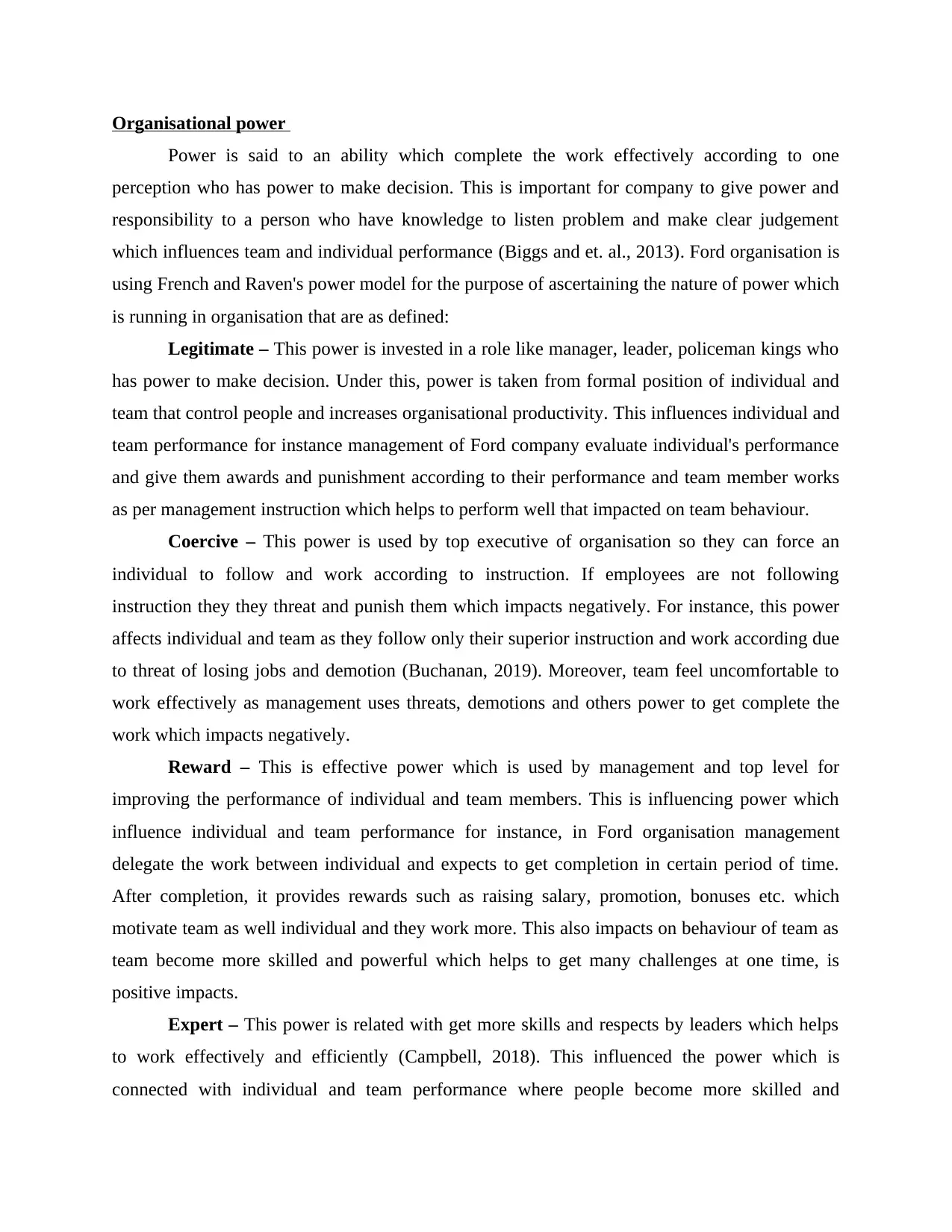
Organisational power
Power is said to an ability which complete the work effectively according to one
perception who has power to make decision. This is important for company to give power and
responsibility to a person who have knowledge to listen problem and make clear judgement
which influences team and individual performance (Biggs and et. al., 2013). Ford organisation is
using French and Raven's power model for the purpose of ascertaining the nature of power which
is running in organisation that are as defined:
Legitimate – This power is invested in a role like manager, leader, policeman kings who
has power to make decision. Under this, power is taken from formal position of individual and
team that control people and increases organisational productivity. This influences individual and
team performance for instance management of Ford company evaluate individual's performance
and give them awards and punishment according to their performance and team member works
as per management instruction which helps to perform well that impacted on team behaviour.
Coercive – This power is used by top executive of organisation so they can force an
individual to follow and work according to instruction. If employees are not following
instruction they they threat and punish them which impacts negatively. For instance, this power
affects individual and team as they follow only their superior instruction and work according due
to threat of losing jobs and demotion (Buchanan, 2019). Moreover, team feel uncomfortable to
work effectively as management uses threats, demotions and others power to get complete the
work which impacts negatively.
Reward – This is effective power which is used by management and top level for
improving the performance of individual and team members. This is influencing power which
influence individual and team performance for instance, in Ford organisation management
delegate the work between individual and expects to get completion in certain period of time.
After completion, it provides rewards such as raising salary, promotion, bonuses etc. which
motivate team as well individual and they work more. This also impacts on behaviour of team as
team become more skilled and powerful which helps to get many challenges at one time, is
positive impacts.
Expert – This power is related with get more skills and respects by leaders which helps
to work effectively and efficiently (Campbell, 2018). This influenced the power which is
connected with individual and team performance where people become more skilled and
Power is said to an ability which complete the work effectively according to one
perception who has power to make decision. This is important for company to give power and
responsibility to a person who have knowledge to listen problem and make clear judgement
which influences team and individual performance (Biggs and et. al., 2013). Ford organisation is
using French and Raven's power model for the purpose of ascertaining the nature of power which
is running in organisation that are as defined:
Legitimate – This power is invested in a role like manager, leader, policeman kings who
has power to make decision. Under this, power is taken from formal position of individual and
team that control people and increases organisational productivity. This influences individual and
team performance for instance management of Ford company evaluate individual's performance
and give them awards and punishment according to their performance and team member works
as per management instruction which helps to perform well that impacted on team behaviour.
Coercive – This power is used by top executive of organisation so they can force an
individual to follow and work according to instruction. If employees are not following
instruction they they threat and punish them which impacts negatively. For instance, this power
affects individual and team as they follow only their superior instruction and work according due
to threat of losing jobs and demotion (Buchanan, 2019). Moreover, team feel uncomfortable to
work effectively as management uses threats, demotions and others power to get complete the
work which impacts negatively.
Reward – This is effective power which is used by management and top level for
improving the performance of individual and team members. This is influencing power which
influence individual and team performance for instance, in Ford organisation management
delegate the work between individual and expects to get completion in certain period of time.
After completion, it provides rewards such as raising salary, promotion, bonuses etc. which
motivate team as well individual and they work more. This also impacts on behaviour of team as
team become more skilled and powerful which helps to get many challenges at one time, is
positive impacts.
Expert – This power is related with get more skills and respects by leaders which helps
to work effectively and efficiently (Campbell, 2018). This influenced the power which is
connected with individual and team performance where people become more skilled and
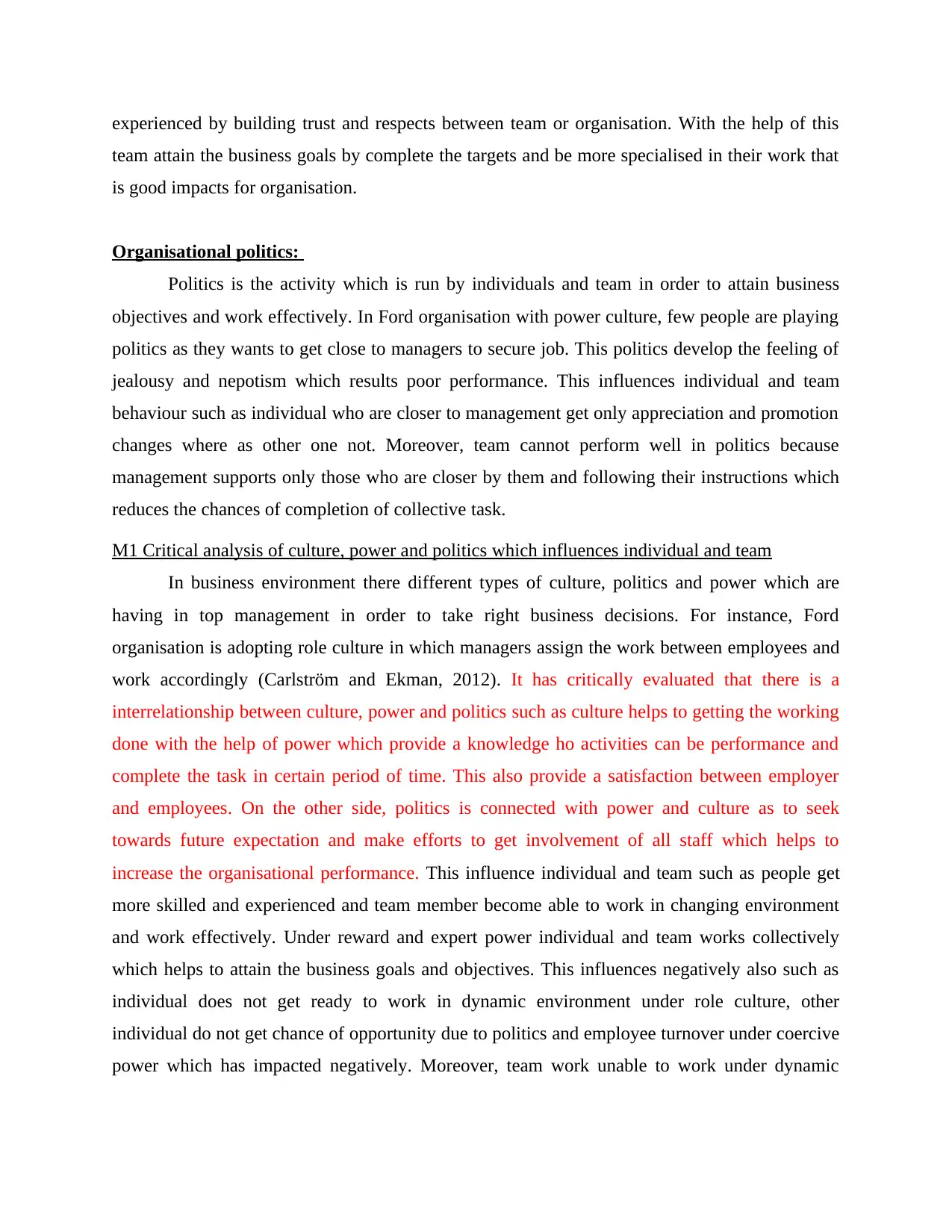
experienced by building trust and respects between team or organisation. With the help of this
team attain the business goals by complete the targets and be more specialised in their work that
is good impacts for organisation.
Organisational politics:
Politics is the activity which is run by individuals and team in order to attain business
objectives and work effectively. In Ford organisation with power culture, few people are playing
politics as they wants to get close to managers to secure job. This politics develop the feeling of
jealousy and nepotism which results poor performance. This influences individual and team
behaviour such as individual who are closer to management get only appreciation and promotion
changes where as other one not. Moreover, team cannot perform well in politics because
management supports only those who are closer by them and following their instructions which
reduces the chances of completion of collective task.
M1 Critical analysis of culture, power and politics which influences individual and team
In business environment there different types of culture, politics and power which are
having in top management in order to take right business decisions. For instance, Ford
organisation is adopting role culture in which managers assign the work between employees and
work accordingly (Carlström and Ekman, 2012). It has critically evaluated that there is a
interrelationship between culture, power and politics such as culture helps to getting the working
done with the help of power which provide a knowledge ho activities can be performance and
complete the task in certain period of time. This also provide a satisfaction between employer
and employees. On the other side, politics is connected with power and culture as to seek
towards future expectation and make efforts to get involvement of all staff which helps to
increase the organisational performance. This influence individual and team such as people get
more skilled and experienced and team member become able to work in changing environment
and work effectively. Under reward and expert power individual and team works collectively
which helps to attain the business goals and objectives. This influences negatively also such as
individual does not get ready to work in dynamic environment under role culture, other
individual do not get chance of opportunity due to politics and employee turnover under coercive
power which has impacted negatively. Moreover, team work unable to work under dynamic
team attain the business goals by complete the targets and be more specialised in their work that
is good impacts for organisation.
Organisational politics:
Politics is the activity which is run by individuals and team in order to attain business
objectives and work effectively. In Ford organisation with power culture, few people are playing
politics as they wants to get close to managers to secure job. This politics develop the feeling of
jealousy and nepotism which results poor performance. This influences individual and team
behaviour such as individual who are closer to management get only appreciation and promotion
changes where as other one not. Moreover, team cannot perform well in politics because
management supports only those who are closer by them and following their instructions which
reduces the chances of completion of collective task.
M1 Critical analysis of culture, power and politics which influences individual and team
In business environment there different types of culture, politics and power which are
having in top management in order to take right business decisions. For instance, Ford
organisation is adopting role culture in which managers assign the work between employees and
work accordingly (Carlström and Ekman, 2012). It has critically evaluated that there is a
interrelationship between culture, power and politics such as culture helps to getting the working
done with the help of power which provide a knowledge ho activities can be performance and
complete the task in certain period of time. This also provide a satisfaction between employer
and employees. On the other side, politics is connected with power and culture as to seek
towards future expectation and make efforts to get involvement of all staff which helps to
increase the organisational performance. This influence individual and team such as people get
more skilled and experienced and team member become able to work in changing environment
and work effectively. Under reward and expert power individual and team works collectively
which helps to attain the business goals and objectives. This influences negatively also such as
individual does not get ready to work in dynamic environment under role culture, other
individual do not get chance of opportunity due to politics and employee turnover under coercive
power which has impacted negatively. Moreover, team work unable to work under dynamic
⊘ This is a preview!⊘
Do you want full access?
Subscribe today to unlock all pages.

Trusted by 1+ million students worldwide
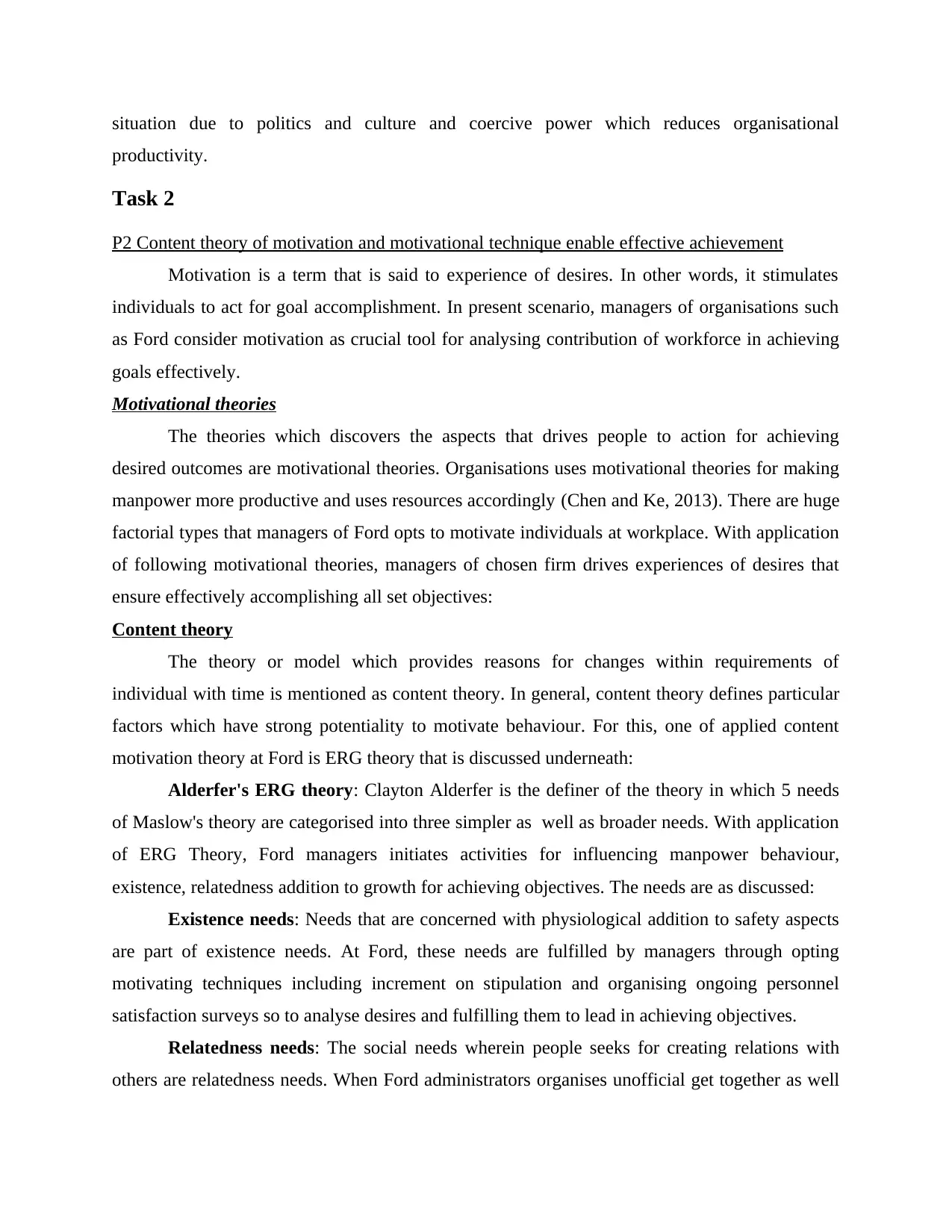
situation due to politics and culture and coercive power which reduces organisational
productivity.
Task 2
P2 Content theory of motivation and motivational technique enable effective achievement
Motivation is a term that is said to experience of desires. In other words, it stimulates
individuals to act for goal accomplishment. In present scenario, managers of organisations such
as Ford consider motivation as crucial tool for analysing contribution of workforce in achieving
goals effectively.
Motivational theories
The theories which discovers the aspects that drives people to action for achieving
desired outcomes are motivational theories. Organisations uses motivational theories for making
manpower more productive and uses resources accordingly (Chen and Ke, 2013). There are huge
factorial types that managers of Ford opts to motivate individuals at workplace. With application
of following motivational theories, managers of chosen firm drives experiences of desires that
ensure effectively accomplishing all set objectives:
Content theory
The theory or model which provides reasons for changes within requirements of
individual with time is mentioned as content theory. In general, content theory defines particular
factors which have strong potentiality to motivate behaviour. For this, one of applied content
motivation theory at Ford is ERG theory that is discussed underneath:
Alderfer's ERG theory: Clayton Alderfer is the definer of the theory in which 5 needs
of Maslow's theory are categorised into three simpler as well as broader needs. With application
of ERG Theory, Ford managers initiates activities for influencing manpower behaviour,
existence, relatedness addition to growth for achieving objectives. The needs are as discussed:
Existence needs: Needs that are concerned with physiological addition to safety aspects
are part of existence needs. At Ford, these needs are fulfilled by managers through opting
motivating techniques including increment on stipulation and organising ongoing personnel
satisfaction surveys so to analyse desires and fulfilling them to lead in achieving objectives.
Relatedness needs: The social needs wherein people seeks for creating relations with
others are relatedness needs. When Ford administrators organises unofficial get together as well
productivity.
Task 2
P2 Content theory of motivation and motivational technique enable effective achievement
Motivation is a term that is said to experience of desires. In other words, it stimulates
individuals to act for goal accomplishment. In present scenario, managers of organisations such
as Ford consider motivation as crucial tool for analysing contribution of workforce in achieving
goals effectively.
Motivational theories
The theories which discovers the aspects that drives people to action for achieving
desired outcomes are motivational theories. Organisations uses motivational theories for making
manpower more productive and uses resources accordingly (Chen and Ke, 2013). There are huge
factorial types that managers of Ford opts to motivate individuals at workplace. With application
of following motivational theories, managers of chosen firm drives experiences of desires that
ensure effectively accomplishing all set objectives:
Content theory
The theory or model which provides reasons for changes within requirements of
individual with time is mentioned as content theory. In general, content theory defines particular
factors which have strong potentiality to motivate behaviour. For this, one of applied content
motivation theory at Ford is ERG theory that is discussed underneath:
Alderfer's ERG theory: Clayton Alderfer is the definer of the theory in which 5 needs
of Maslow's theory are categorised into three simpler as well as broader needs. With application
of ERG Theory, Ford managers initiates activities for influencing manpower behaviour,
existence, relatedness addition to growth for achieving objectives. The needs are as discussed:
Existence needs: Needs that are concerned with physiological addition to safety aspects
are part of existence needs. At Ford, these needs are fulfilled by managers through opting
motivating techniques including increment on stipulation and organising ongoing personnel
satisfaction surveys so to analyse desires and fulfilling them to lead in achieving objectives.
Relatedness needs: The social needs wherein people seeks for creating relations with
others are relatedness needs. When Ford administrators organises unofficial get together as well
Paraphrase This Document
Need a fresh take? Get an instant paraphrase of this document with our AI Paraphraser
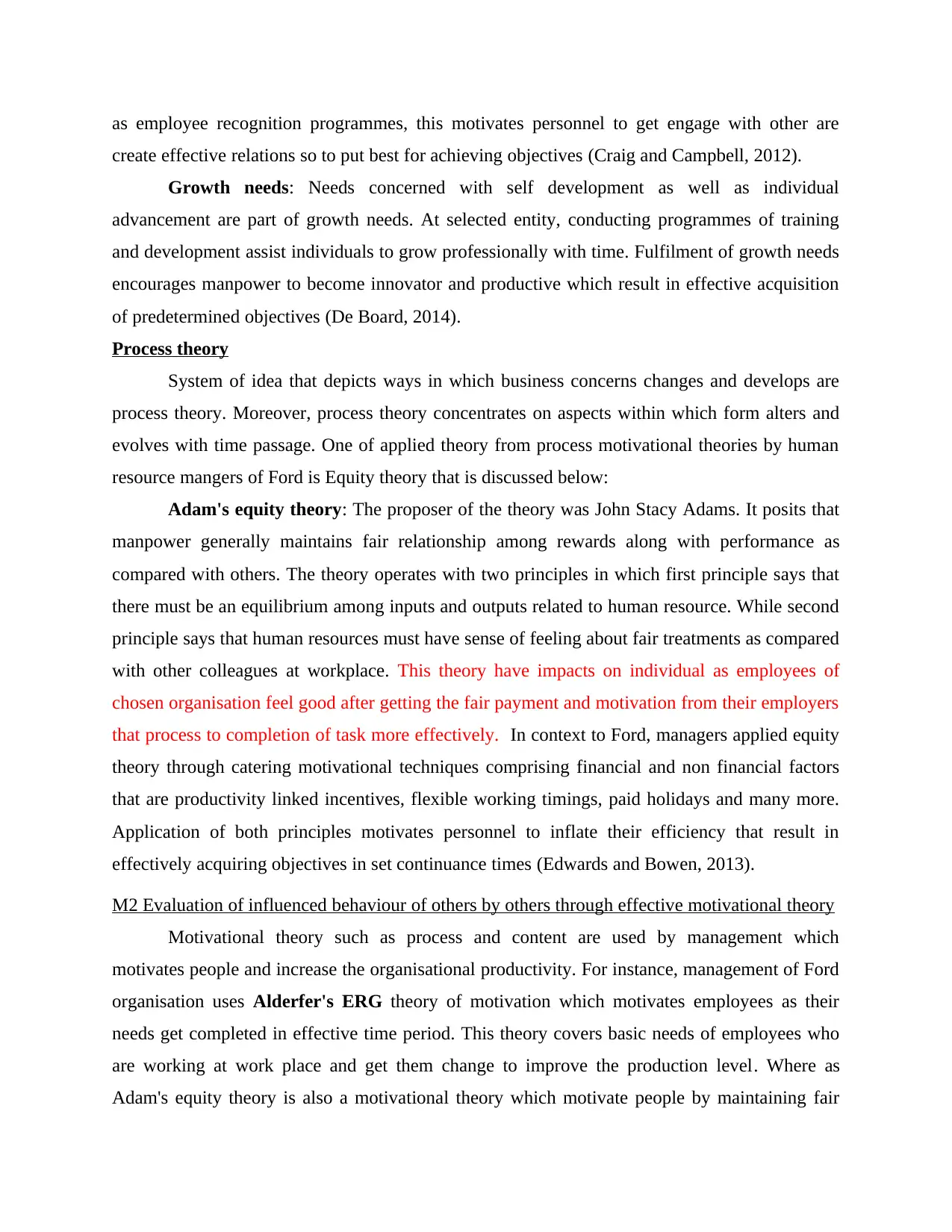
as employee recognition programmes, this motivates personnel to get engage with other are
create effective relations so to put best for achieving objectives (Craig and Campbell, 2012).
Growth needs: Needs concerned with self development as well as individual
advancement are part of growth needs. At selected entity, conducting programmes of training
and development assist individuals to grow professionally with time. Fulfilment of growth needs
encourages manpower to become innovator and productive which result in effective acquisition
of predetermined objectives (De Board, 2014).
Process theory
System of idea that depicts ways in which business concerns changes and develops are
process theory. Moreover, process theory concentrates on aspects within which form alters and
evolves with time passage. One of applied theory from process motivational theories by human
resource mangers of Ford is Equity theory that is discussed below:
Adam's equity theory: The proposer of the theory was John Stacy Adams. It posits that
manpower generally maintains fair relationship among rewards along with performance as
compared with others. The theory operates with two principles in which first principle says that
there must be an equilibrium among inputs and outputs related to human resource. While second
principle says that human resources must have sense of feeling about fair treatments as compared
with other colleagues at workplace. This theory have impacts on individual as employees of
chosen organisation feel good after getting the fair payment and motivation from their employers
that process to completion of task more effectively. In context to Ford, managers applied equity
theory through catering motivational techniques comprising financial and non financial factors
that are productivity linked incentives, flexible working timings, paid holidays and many more.
Application of both principles motivates personnel to inflate their efficiency that result in
effectively acquiring objectives in set continuance times (Edwards and Bowen, 2013).
M2 Evaluation of influenced behaviour of others by others through effective motivational theory
Motivational theory such as process and content are used by management which
motivates people and increase the organisational productivity. For instance, management of Ford
organisation uses Alderfer's ERG theory of motivation which motivates employees as their
needs get completed in effective time period. This theory covers basic needs of employees who
are working at work place and get them change to improve the production level. Where as
Adam's equity theory is also a motivational theory which motivate people by maintaining fair
create effective relations so to put best for achieving objectives (Craig and Campbell, 2012).
Growth needs: Needs concerned with self development as well as individual
advancement are part of growth needs. At selected entity, conducting programmes of training
and development assist individuals to grow professionally with time. Fulfilment of growth needs
encourages manpower to become innovator and productive which result in effective acquisition
of predetermined objectives (De Board, 2014).
Process theory
System of idea that depicts ways in which business concerns changes and develops are
process theory. Moreover, process theory concentrates on aspects within which form alters and
evolves with time passage. One of applied theory from process motivational theories by human
resource mangers of Ford is Equity theory that is discussed below:
Adam's equity theory: The proposer of the theory was John Stacy Adams. It posits that
manpower generally maintains fair relationship among rewards along with performance as
compared with others. The theory operates with two principles in which first principle says that
there must be an equilibrium among inputs and outputs related to human resource. While second
principle says that human resources must have sense of feeling about fair treatments as compared
with other colleagues at workplace. This theory have impacts on individual as employees of
chosen organisation feel good after getting the fair payment and motivation from their employers
that process to completion of task more effectively. In context to Ford, managers applied equity
theory through catering motivational techniques comprising financial and non financial factors
that are productivity linked incentives, flexible working timings, paid holidays and many more.
Application of both principles motivates personnel to inflate their efficiency that result in
effectively acquiring objectives in set continuance times (Edwards and Bowen, 2013).
M2 Evaluation of influenced behaviour of others by others through effective motivational theory
Motivational theory such as process and content are used by management which
motivates people and increase the organisational productivity. For instance, management of Ford
organisation uses Alderfer's ERG theory of motivation which motivates employees as their
needs get completed in effective time period. This theory covers basic needs of employees who
are working at work place and get them change to improve the production level. Where as
Adam's equity theory is also a motivational theory which motivate people by maintaining fair
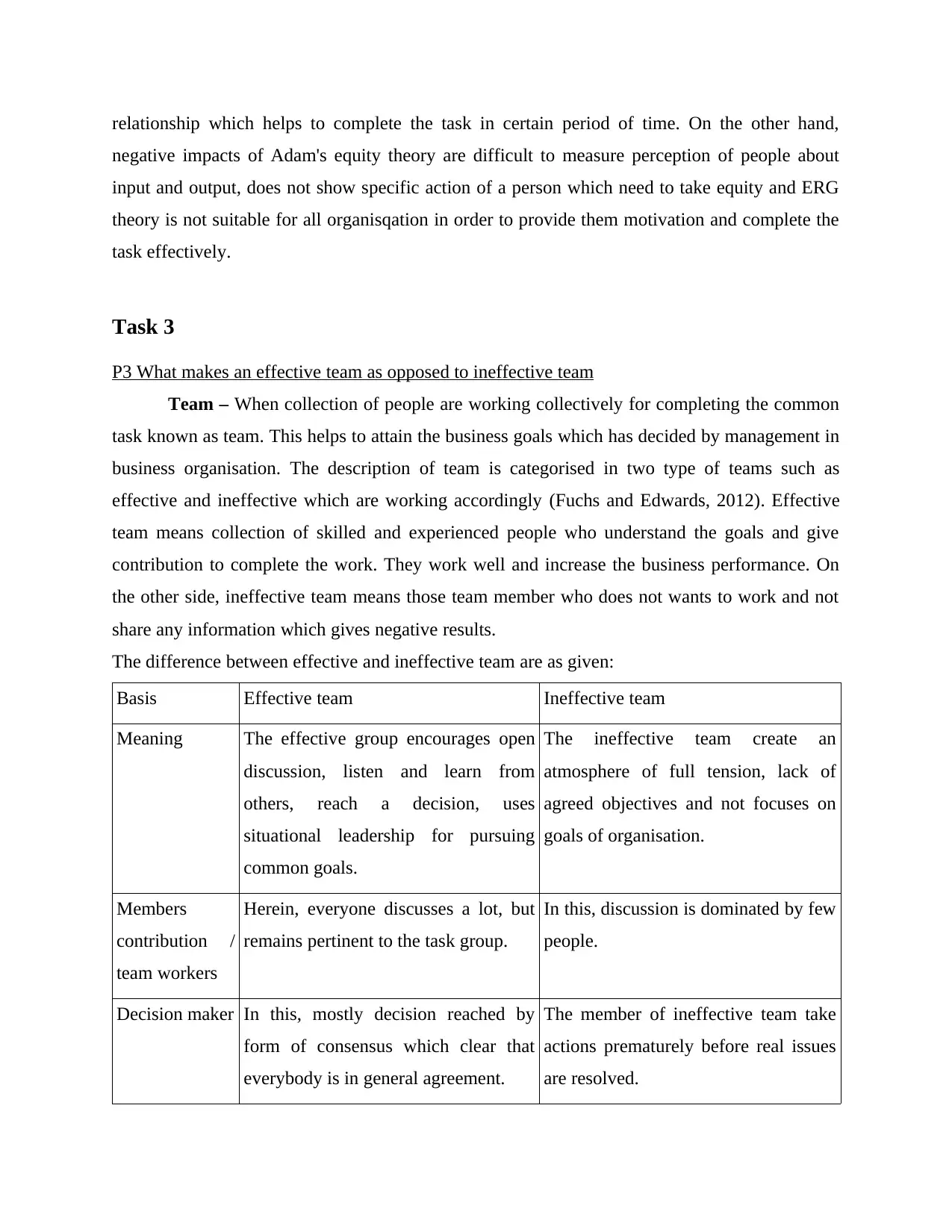
relationship which helps to complete the task in certain period of time. On the other hand,
negative impacts of Adam's equity theory are difficult to measure perception of people about
input and output, does not show specific action of a person which need to take equity and ERG
theory is not suitable for all organisqation in order to provide them motivation and complete the
task effectively.
Task 3
P3 What makes an effective team as opposed to ineffective team
Team – When collection of people are working collectively for completing the common
task known as team. This helps to attain the business goals which has decided by management in
business organisation. The description of team is categorised in two type of teams such as
effective and ineffective which are working accordingly (Fuchs and Edwards, 2012). Effective
team means collection of skilled and experienced people who understand the goals and give
contribution to complete the work. They work well and increase the business performance. On
the other side, ineffective team means those team member who does not wants to work and not
share any information which gives negative results.
The difference between effective and ineffective team are as given:
Basis Effective team Ineffective team
Meaning The effective group encourages open
discussion, listen and learn from
others, reach a decision, uses
situational leadership for pursuing
common goals.
The ineffective team create an
atmosphere of full tension, lack of
agreed objectives and not focuses on
goals of organisation.
Members
contribution /
team workers
Herein, everyone discusses a lot, but
remains pertinent to the task group.
In this, discussion is dominated by few
people.
Decision maker In this, mostly decision reached by
form of consensus which clear that
everybody is in general agreement.
The member of ineffective team take
actions prematurely before real issues
are resolved.
negative impacts of Adam's equity theory are difficult to measure perception of people about
input and output, does not show specific action of a person which need to take equity and ERG
theory is not suitable for all organisqation in order to provide them motivation and complete the
task effectively.
Task 3
P3 What makes an effective team as opposed to ineffective team
Team – When collection of people are working collectively for completing the common
task known as team. This helps to attain the business goals which has decided by management in
business organisation. The description of team is categorised in two type of teams such as
effective and ineffective which are working accordingly (Fuchs and Edwards, 2012). Effective
team means collection of skilled and experienced people who understand the goals and give
contribution to complete the work. They work well and increase the business performance. On
the other side, ineffective team means those team member who does not wants to work and not
share any information which gives negative results.
The difference between effective and ineffective team are as given:
Basis Effective team Ineffective team
Meaning The effective group encourages open
discussion, listen and learn from
others, reach a decision, uses
situational leadership for pursuing
common goals.
The ineffective team create an
atmosphere of full tension, lack of
agreed objectives and not focuses on
goals of organisation.
Members
contribution /
team workers
Herein, everyone discusses a lot, but
remains pertinent to the task group.
In this, discussion is dominated by few
people.
Decision maker In this, mostly decision reached by
form of consensus which clear that
everybody is in general agreement.
The member of ineffective team take
actions prematurely before real issues
are resolved.
⊘ This is a preview!⊘
Do you want full access?
Subscribe today to unlock all pages.

Trusted by 1+ million students worldwide
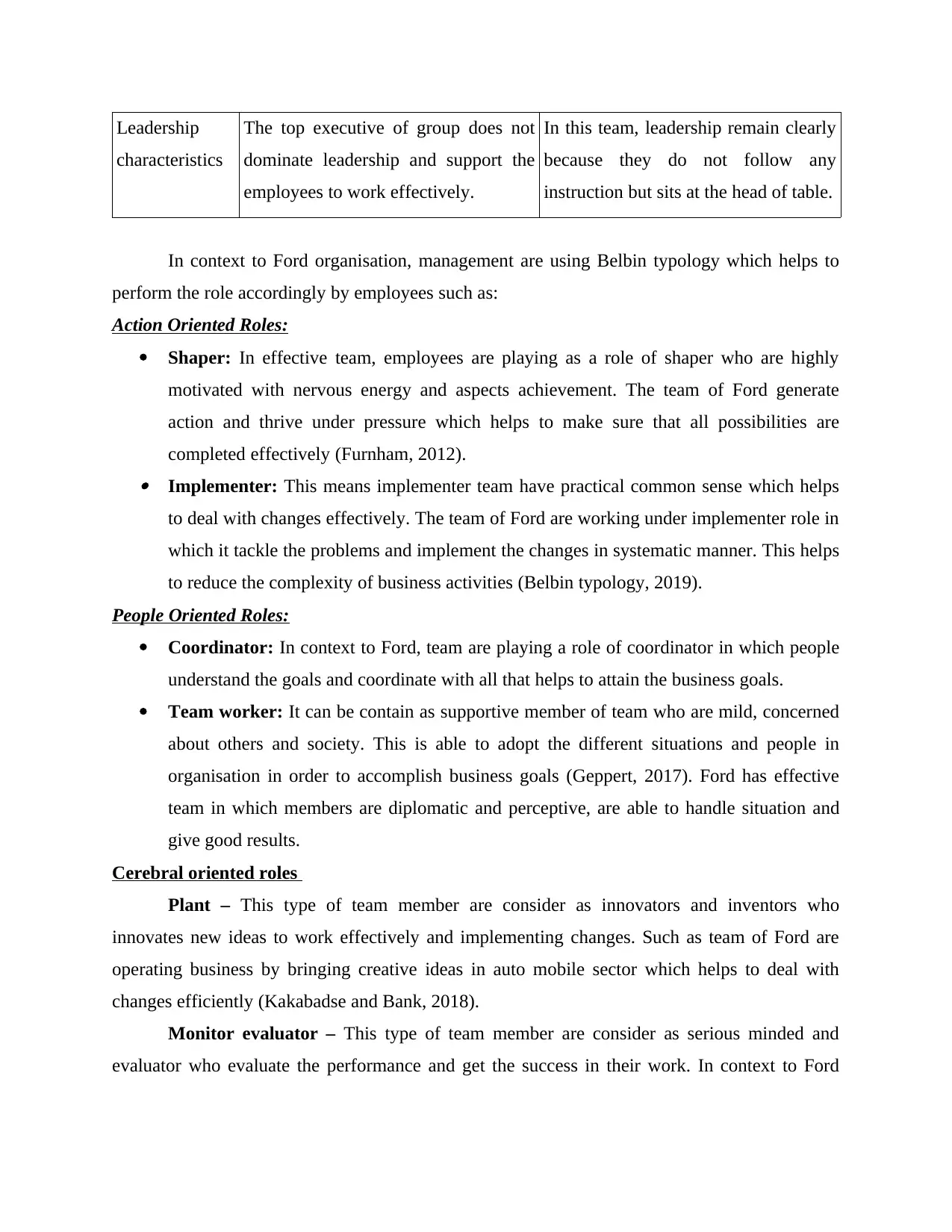
Leadership
characteristics
The top executive of group does not
dominate leadership and support the
employees to work effectively.
In this team, leadership remain clearly
because they do not follow any
instruction but sits at the head of table.
In context to Ford organisation, management are using Belbin typology which helps to
perform the role accordingly by employees such as:
Action Oriented Roles:
Shaper: In effective team, employees are playing as a role of shaper who are highly
motivated with nervous energy and aspects achievement. The team of Ford generate
action and thrive under pressure which helps to make sure that all possibilities are
completed effectively (Furnham, 2012). Implementer: This means implementer team have practical common sense which helps
to deal with changes effectively. The team of Ford are working under implementer role in
which it tackle the problems and implement the changes in systematic manner. This helps
to reduce the complexity of business activities (Belbin typology, 2019).
People Oriented Roles:
Coordinator: In context to Ford, team are playing a role of coordinator in which people
understand the goals and coordinate with all that helps to attain the business goals.
Team worker: It can be contain as supportive member of team who are mild, concerned
about others and society. This is able to adopt the different situations and people in
organisation in order to accomplish business goals (Geppert, 2017). Ford has effective
team in which members are diplomatic and perceptive, are able to handle situation and
give good results.
Cerebral oriented roles
Plant – This type of team member are consider as innovators and inventors who
innovates new ideas to work effectively and implementing changes. Such as team of Ford are
operating business by bringing creative ideas in auto mobile sector which helps to deal with
changes efficiently (Kakabadse and Bank, 2018).
Monitor evaluator – This type of team member are consider as serious minded and
evaluator who evaluate the performance and get the success in their work. In context to Ford
characteristics
The top executive of group does not
dominate leadership and support the
employees to work effectively.
In this team, leadership remain clearly
because they do not follow any
instruction but sits at the head of table.
In context to Ford organisation, management are using Belbin typology which helps to
perform the role accordingly by employees such as:
Action Oriented Roles:
Shaper: In effective team, employees are playing as a role of shaper who are highly
motivated with nervous energy and aspects achievement. The team of Ford generate
action and thrive under pressure which helps to make sure that all possibilities are
completed effectively (Furnham, 2012). Implementer: This means implementer team have practical common sense which helps
to deal with changes effectively. The team of Ford are working under implementer role in
which it tackle the problems and implement the changes in systematic manner. This helps
to reduce the complexity of business activities (Belbin typology, 2019).
People Oriented Roles:
Coordinator: In context to Ford, team are playing a role of coordinator in which people
understand the goals and coordinate with all that helps to attain the business goals.
Team worker: It can be contain as supportive member of team who are mild, concerned
about others and society. This is able to adopt the different situations and people in
organisation in order to accomplish business goals (Geppert, 2017). Ford has effective
team in which members are diplomatic and perceptive, are able to handle situation and
give good results.
Cerebral oriented roles
Plant – This type of team member are consider as innovators and inventors who
innovates new ideas to work effectively and implementing changes. Such as team of Ford are
operating business by bringing creative ideas in auto mobile sector which helps to deal with
changes efficiently (Kakabadse and Bank, 2018).
Monitor evaluator – This type of team member are consider as serious minded and
evaluator who evaluate the performance and get the success in their work. In context to Ford
Paraphrase This Document
Need a fresh take? Get an instant paraphrase of this document with our AI Paraphraser
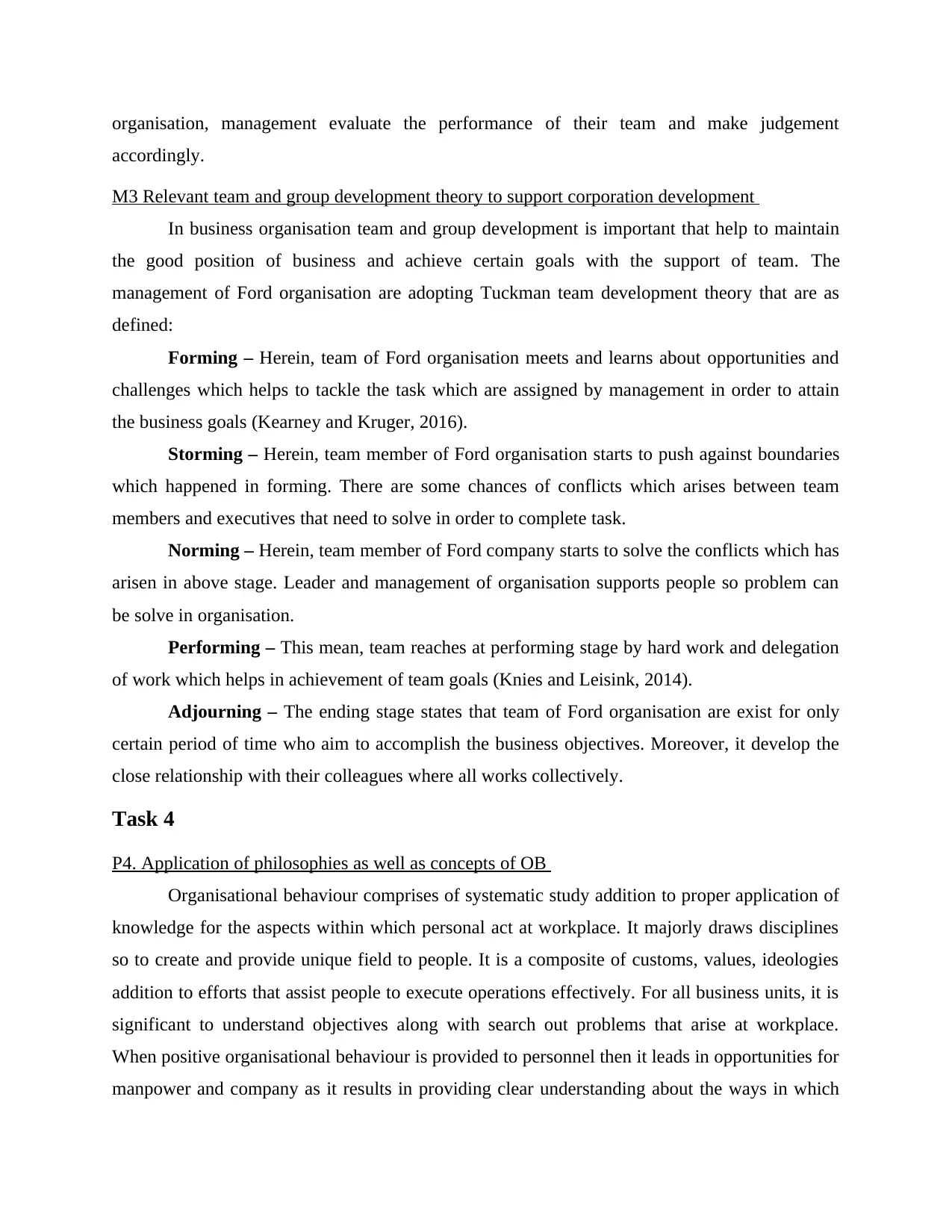
organisation, management evaluate the performance of their team and make judgement
accordingly.
M3 Relevant team and group development theory to support corporation development
In business organisation team and group development is important that help to maintain
the good position of business and achieve certain goals with the support of team. The
management of Ford organisation are adopting Tuckman team development theory that are as
defined:
Forming – Herein, team of Ford organisation meets and learns about opportunities and
challenges which helps to tackle the task which are assigned by management in order to attain
the business goals (Kearney and Kruger, 2016).
Storming – Herein, team member of Ford organisation starts to push against boundaries
which happened in forming. There are some chances of conflicts which arises between team
members and executives that need to solve in order to complete task.
Norming – Herein, team member of Ford company starts to solve the conflicts which has
arisen in above stage. Leader and management of organisation supports people so problem can
be solve in organisation.
Performing – This mean, team reaches at performing stage by hard work and delegation
of work which helps in achievement of team goals (Knies and Leisink, 2014).
Adjourning – The ending stage states that team of Ford organisation are exist for only
certain period of time who aim to accomplish the business objectives. Moreover, it develop the
close relationship with their colleagues where all works collectively.
Task 4
P4. Application of philosophies as well as concepts of OB
Organisational behaviour comprises of systematic study addition to proper application of
knowledge for the aspects within which personal act at workplace. It majorly draws disciplines
so to create and provide unique field to people. It is a composite of customs, values, ideologies
addition to efforts that assist people to execute operations effectively. For all business units, it is
significant to understand objectives along with search out problems that arise at workplace.
When positive organisational behaviour is provided to personnel then it leads in opportunities for
manpower and company as it results in providing clear understanding about the ways in which
accordingly.
M3 Relevant team and group development theory to support corporation development
In business organisation team and group development is important that help to maintain
the good position of business and achieve certain goals with the support of team. The
management of Ford organisation are adopting Tuckman team development theory that are as
defined:
Forming – Herein, team of Ford organisation meets and learns about opportunities and
challenges which helps to tackle the task which are assigned by management in order to attain
the business goals (Kearney and Kruger, 2016).
Storming – Herein, team member of Ford organisation starts to push against boundaries
which happened in forming. There are some chances of conflicts which arises between team
members and executives that need to solve in order to complete task.
Norming – Herein, team member of Ford company starts to solve the conflicts which has
arisen in above stage. Leader and management of organisation supports people so problem can
be solve in organisation.
Performing – This mean, team reaches at performing stage by hard work and delegation
of work which helps in achievement of team goals (Knies and Leisink, 2014).
Adjourning – The ending stage states that team of Ford organisation are exist for only
certain period of time who aim to accomplish the business objectives. Moreover, it develop the
close relationship with their colleagues where all works collectively.
Task 4
P4. Application of philosophies as well as concepts of OB
Organisational behaviour comprises of systematic study addition to proper application of
knowledge for the aspects within which personal act at workplace. It majorly draws disciplines
so to create and provide unique field to people. It is a composite of customs, values, ideologies
addition to efforts that assist people to execute operations effectively. For all business units, it is
significant to understand objectives along with search out problems that arise at workplace.
When positive organisational behaviour is provided to personnel then it leads in opportunities for
manpower and company as it results in providing clear understanding about the ways in which
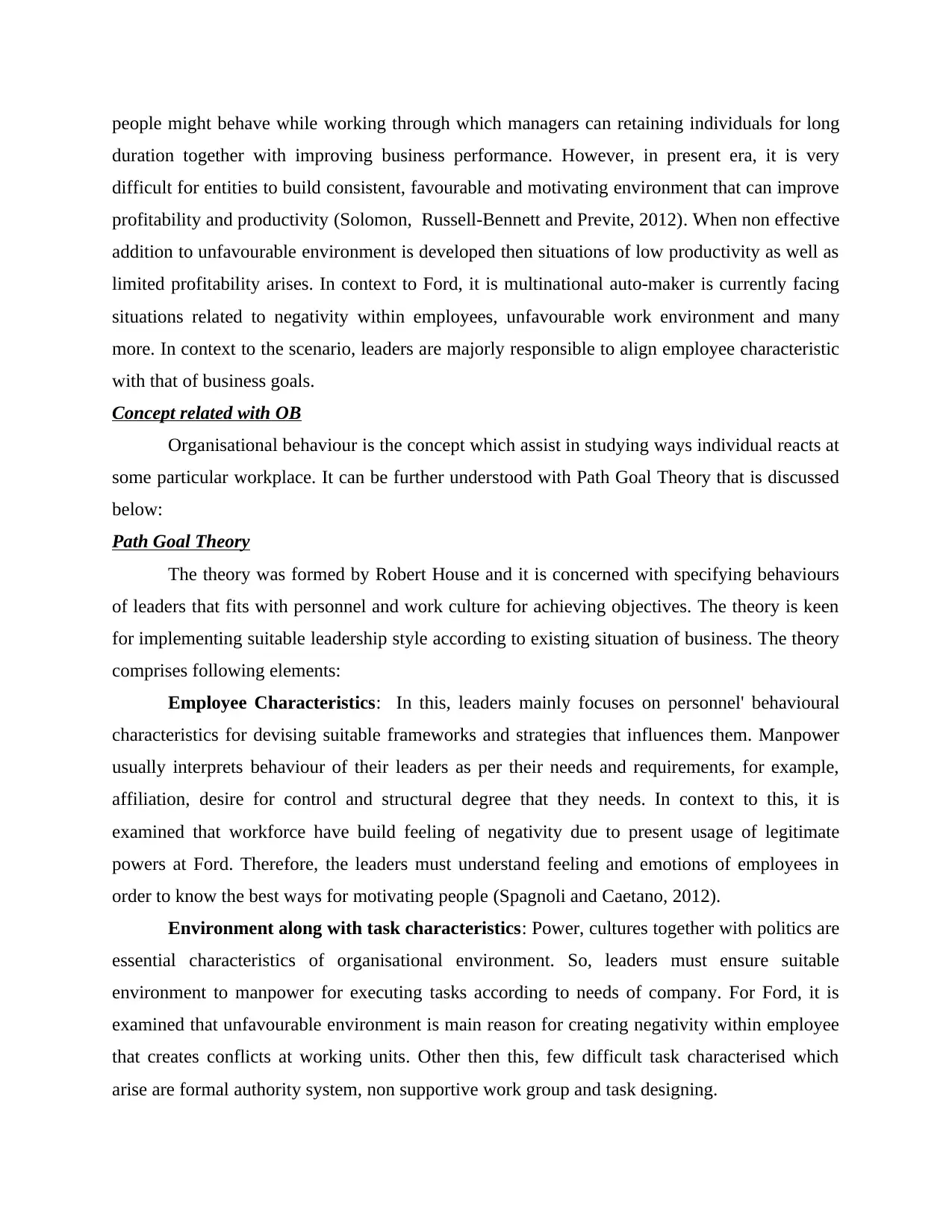
people might behave while working through which managers can retaining individuals for long
duration together with improving business performance. However, in present era, it is very
difficult for entities to build consistent, favourable and motivating environment that can improve
profitability and productivity (Solomon, Russell-Bennett and Previte, 2012). When non effective
addition to unfavourable environment is developed then situations of low productivity as well as
limited profitability arises. In context to Ford, it is multinational auto-maker is currently facing
situations related to negativity within employees, unfavourable work environment and many
more. In context to the scenario, leaders are majorly responsible to align employee characteristic
with that of business goals.
Concept related with OB
Organisational behaviour is the concept which assist in studying ways individual reacts at
some particular workplace. It can be further understood with Path Goal Theory that is discussed
below:
Path Goal Theory
The theory was formed by Robert House and it is concerned with specifying behaviours
of leaders that fits with personnel and work culture for achieving objectives. The theory is keen
for implementing suitable leadership style according to existing situation of business. The theory
comprises following elements:
Employee Characteristics: In this, leaders mainly focuses on personnel' behavioural
characteristics for devising suitable frameworks and strategies that influences them. Manpower
usually interprets behaviour of their leaders as per their needs and requirements, for example,
affiliation, desire for control and structural degree that they needs. In context to this, it is
examined that workforce have build feeling of negativity due to present usage of legitimate
powers at Ford. Therefore, the leaders must understand feeling and emotions of employees in
order to know the best ways for motivating people (Spagnoli and Caetano, 2012).
Environment along with task characteristics: Power, cultures together with politics are
essential characteristics of organisational environment. So, leaders must ensure suitable
environment to manpower for executing tasks according to needs of company. For Ford, it is
examined that unfavourable environment is main reason for creating negativity within employee
that creates conflicts at working units. Other then this, few difficult task characterised which
arise are formal authority system, non supportive work group and task designing.
duration together with improving business performance. However, in present era, it is very
difficult for entities to build consistent, favourable and motivating environment that can improve
profitability and productivity (Solomon, Russell-Bennett and Previte, 2012). When non effective
addition to unfavourable environment is developed then situations of low productivity as well as
limited profitability arises. In context to Ford, it is multinational auto-maker is currently facing
situations related to negativity within employees, unfavourable work environment and many
more. In context to the scenario, leaders are majorly responsible to align employee characteristic
with that of business goals.
Concept related with OB
Organisational behaviour is the concept which assist in studying ways individual reacts at
some particular workplace. It can be further understood with Path Goal Theory that is discussed
below:
Path Goal Theory
The theory was formed by Robert House and it is concerned with specifying behaviours
of leaders that fits with personnel and work culture for achieving objectives. The theory is keen
for implementing suitable leadership style according to existing situation of business. The theory
comprises following elements:
Employee Characteristics: In this, leaders mainly focuses on personnel' behavioural
characteristics for devising suitable frameworks and strategies that influences them. Manpower
usually interprets behaviour of their leaders as per their needs and requirements, for example,
affiliation, desire for control and structural degree that they needs. In context to this, it is
examined that workforce have build feeling of negativity due to present usage of legitimate
powers at Ford. Therefore, the leaders must understand feeling and emotions of employees in
order to know the best ways for motivating people (Spagnoli and Caetano, 2012).
Environment along with task characteristics: Power, cultures together with politics are
essential characteristics of organisational environment. So, leaders must ensure suitable
environment to manpower for executing tasks according to needs of company. For Ford, it is
examined that unfavourable environment is main reason for creating negativity within employee
that creates conflicts at working units. Other then this, few difficult task characterised which
arise are formal authority system, non supportive work group and task designing.
⊘ This is a preview!⊘
Do you want full access?
Subscribe today to unlock all pages.

Trusted by 1+ million students worldwide
1 out of 16
Related Documents
Your All-in-One AI-Powered Toolkit for Academic Success.
+13062052269
info@desklib.com
Available 24*7 on WhatsApp / Email
![[object Object]](/_next/static/media/star-bottom.7253800d.svg)
Unlock your academic potential
Copyright © 2020–2026 A2Z Services. All Rights Reserved. Developed and managed by ZUCOL.





